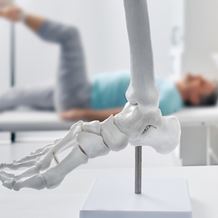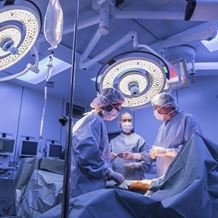
We can provide specialist advice on a wide range of conditions that cause recurrent knee pain. Treatments include total knee replacement, knee arthroscopy and Anterior Cruciate Ligament (ACL) repair.
- Home
- Services
- Orthopaedics
- Knee Orthopaedics
Knee Conditions & Our Treatments
I have a knee condition, what are my next steps?
If you have been experiencing knee pain and are concerned that you may need a knee replacement, the first step is to make an appointment with your GP. You doctor will be able to perform a series of tests, including a physical examination, to identify the nature and location of the problem. Sometimes, further tests may be necessary such as an X-ray or ultrasound.
Once your doctor has confirmed the results, you can discuss suitable treatment options available to you that will achieve the best outcome and recovery. Should your doctor consider a knee replacement or other knee surgeries, you will be provided with a referral for a consultation with an orthopaedic hip specialist at your nearest St Vincent’s Private Hospital.

-
Step 1
GP
ReferralSee your GP about getting a referral for your specialist appointment at your nearest St Vincent’s Private Hospital.
-
Step 2
Specialist
ConsultationTalk to our world-leading specialists about the most suitable treatment options available to support your needs.
-
Step 3
Your
TreatmentExperience the streamlined care available from our team of experts as we help support you through your hospital admission, procedure and rehabilitation.
-
Step 4
Your
RecoveryOur rehabilitation team will guide you each step of the way as you regain your strength and independence.
Find an orthopaedic specialist
Find a specialist
Frequently Asked Questions
For patients without insurance, we offer self-funded knee replacement surgery options. While the exact costs will depend on your individual circumstances, our team is available to provide guidance and an estimate. To learn more or request a detailed quote, please contact us directly.
Knee replacement surgery, also known as arthroplasty, is when the worn ends of the bone and remaining hard cartilage are removed and replaced with metal and plastic parts. In a healthy knee, hard cartilage is there to protect the bones from rubbing up against each other. But when disease or injury disrupt this smooth function it can cause intense pain and discomfort. If the hard cartilage gets worn away, knee replacement surgery will remove the diseased areas of the knee joint and replace it with artificial parts. If only one side of your knee is affected, it is also possible to have a partial knee replacement.
If you suffer from recurring knee pain and stiffness and you have already tried diet and exercise as well as simple analgesics, a surgical procedure could be the next step. Your doctor may recommend that you seek specialist advice if you are experiencing:
• Difficulties with everyday tasks such as climbing the stairs, walking or getting up
• Stiffness and pain even when resting
You are likely to be on crutches for the first 2 weeks after surgery and your mobility and movement will be reduced. It’s a good idea to prepare for your recovery in advance, such as organising some help with your cooking, cleaning and shopping. Regular walking is crucial to your rehabilitation so make sure you have plenty of room to move around when you return home. You will need a comfortable seating area – ideally with a reclining seat to elevate your legs, and any necessary items such as glasses and phones should be kept nearby. It’s a good idea to set up a temporary sleeping area on the main level to avoid using the stairs.
The first 12 weeks after your operation are very important to ensure an optimal recovery.
Gaining excessive amounts of weight will hinder your recovery. It places increased pressure on your new joint in the long term which potentially reduces the lifespan of your implant. If you or your doctor suspect infection or have any increased pain after surgery, always contact your surgeon for advice.



